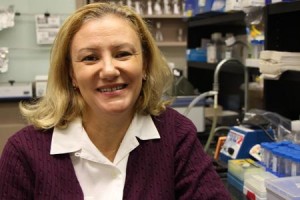
Elizabeth Fidalgo da Silva is seen here in the biology lab where she conducts her research on a protein called tuberin.
A biology researcher hopes her studies will result in fewer brain cancer related deaths among children.
Elizabeth Fidalgo da Silva, a research associate and adjunct professor in Biological Sciences, is studying the role that a protein called tuberin plays in suppressing medulloblastoma, the most prevalent of all childhood brain cancers. Brain cancer remains the second-leading cause of cancer related death in children under 19 and the third leading cause in young adults between 20 and 39.
“If we can understand the mechanism of this protein then we can develop better therapies and treatments,” she said. “This means that patients diagnosed with MB will have a better quality of life during and after treatment, and that fewer people will die from this cancer.”
Dr. Fidalgo da Silva was one of four UWindsor researchers to receive a two-year grant of $72,000 last fall from Seeds4Hope, a program of the Windsor and Essex County Cancer Centre Foundation. Now in its fourth year, the program funds locally-based, peer-reviewed innovative cancer research in the hope that it will result in new discoveries that will attract greater amounts of funding from larger agencies.
Medulloblastomas are the most common and severe childhood brain cancers, Fidalgo da Silva said. They are invasive and rapidly growing, and survival rates for children are only about five years. Aggressive treatment regimens have improved those rates, however, about one-third of the patients remain incurable and current treatments pose many long-term side effects.
Fidalgo da Silva said tuberin is a tumour suppressor and is necessary for proper brain development. The aim of her research is to understand the role it plays in normal brain development and to determine whether it’s responsible for the formation of brain tumour stem cells. Previous research has shown that brain tumour stem cells within the tumour mass may play a key role in the initiation and progression of such cancers such as medulloblastoma.
“Previous research has demonstrated that an absence of tuberin might cause this cancer, but that still needs to be conclusively determined,” she said.
To better understand its role, Fidalgo da Silva will conduct experiments with cerebellum cell lines, as well as in mice with tuberin genes from other species. She’ll study the stem cell differentiation process in the cerebellum cell line by lowering the tuberin in some, while over-expressing it in others. She’ll study the role tuberin plays in the brain development of mice by reducing its levels in one, while deleting the tuberin functional domain in the other.
Fidalgo da Silva said she hopes the research will result in future collaborations with Windsor Regional Cancer Center, and other centres with expertise in brain cancers like Sick Kids Hospital and McMaster University.
“Improving ties between our university and local hospitals with other medical centres in the province is very important,” she said.
Source: UWindsor Daily News
